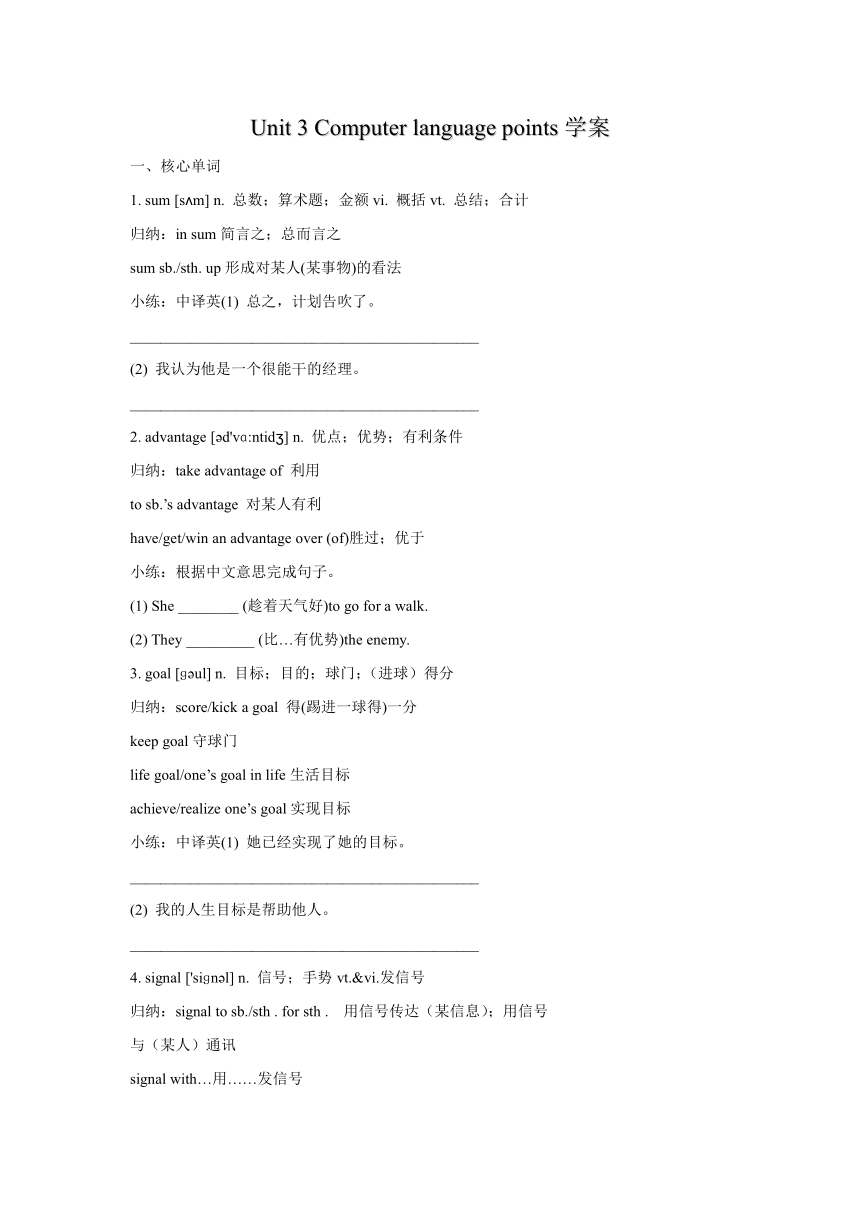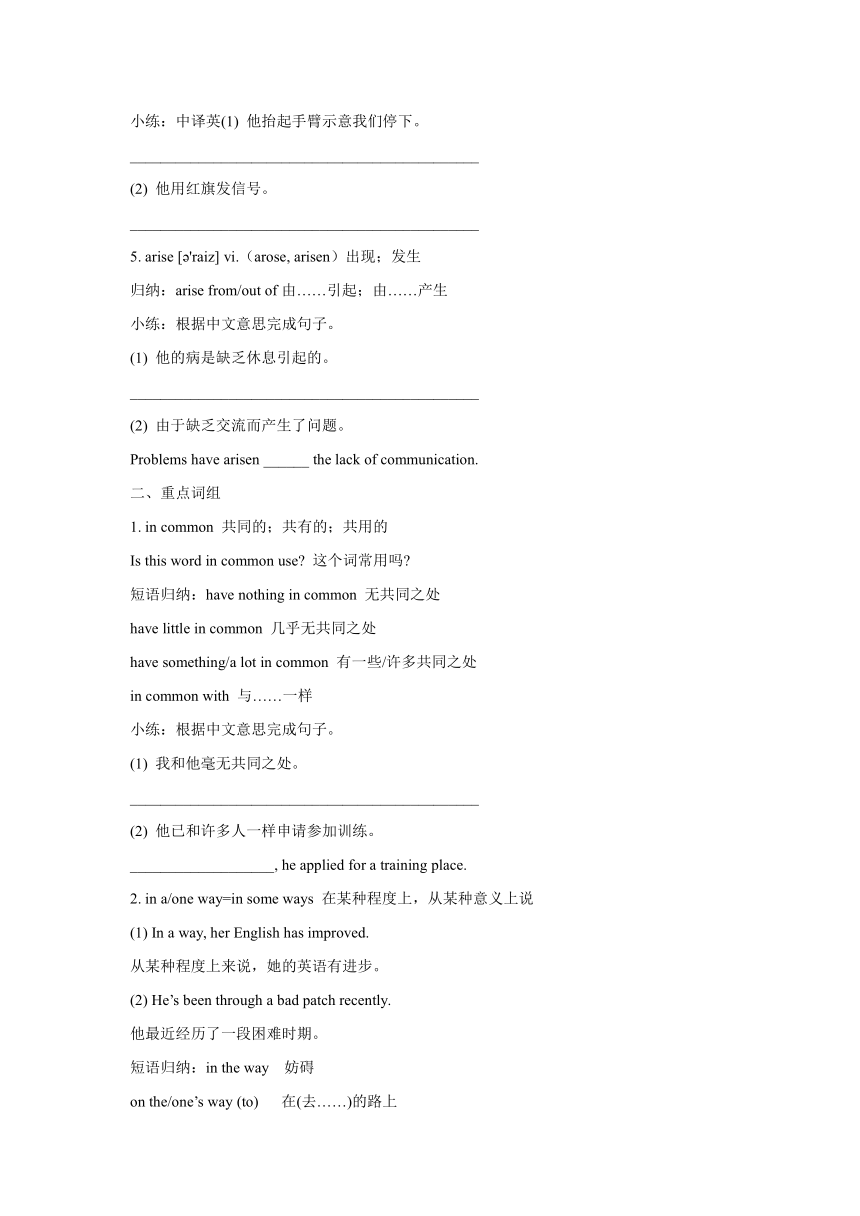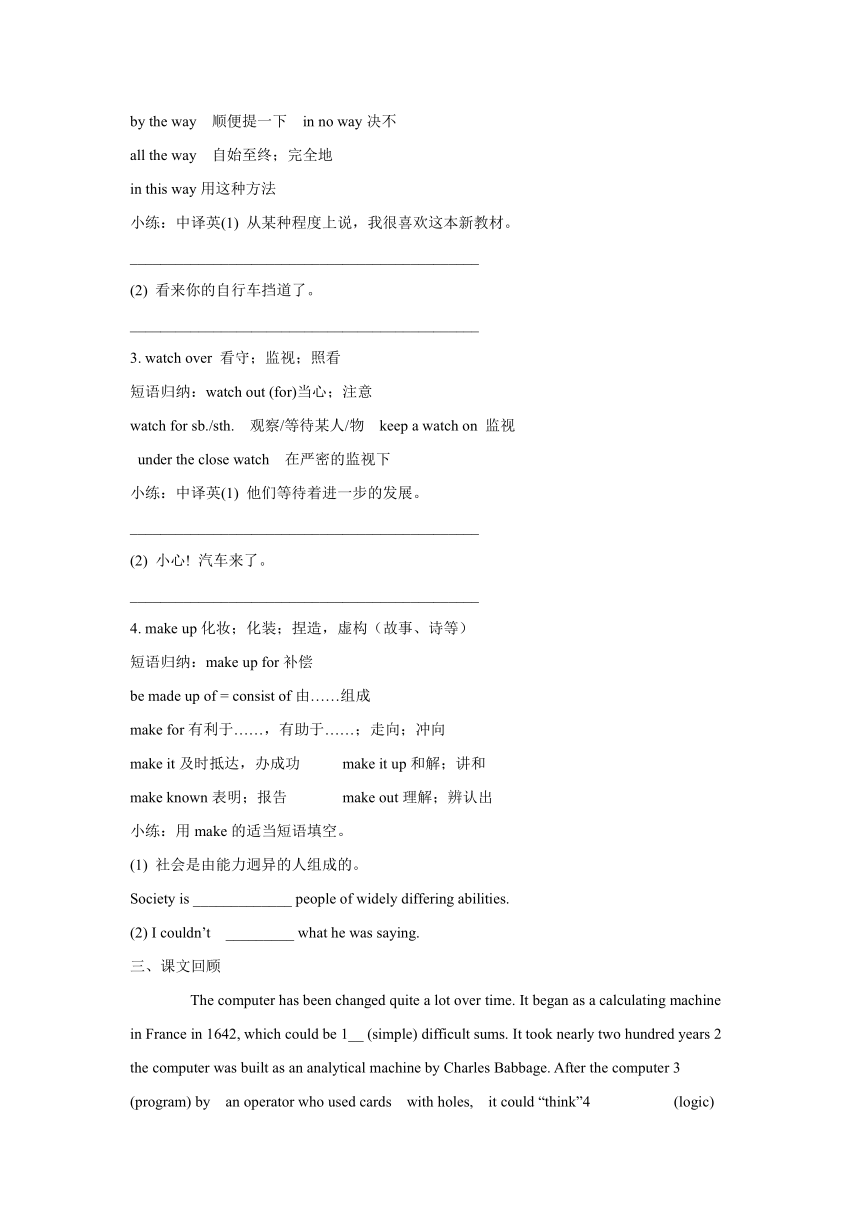人教版必修二Unit 3 Computer language points学案
文档属性
| 名称 | 人教版必修二Unit 3 Computer language points学案 |  | |
| 格式 | docx | ||
| 文件大小 | 22.4KB | ||
| 资源类型 | 教案 | ||
| 版本资源 | 人教版(新课程标准) | ||
| 科目 | 英语 | ||
| 更新时间 | 2020-12-17 16:42:15 | ||
图片预览




文档简介
Unit 3 Computer language points学案
一、核心单词
1. sum [s?m] n. 总数;算术题;金额vi. 概括vt. 总结;合计
归纳:in sum简言之;总而言之
sum sb./sth. up形成对某人(某事物)的看法
小练:中译英(1) 总之,计划告吹了。
______________________________________________
(2) 我认为他是一个很能干的经理。
______________________________________________
2. advantage [?d'vɑ:ntid?] n. 优点;优势;有利条件
归纳:take advantage of 利用
to sb.’s advantage 对某人有利
have/get/win an advantage over (of)胜过;优于
小练:根据中文意思完成句子。
(1) She ________ (趁着天气好)to go for a walk.
(2) They _________ (比…有优势)the enemy.
3. goal [ɡ?ul] n. 目标;目的;球门;(进球)得分
归纳:score/kick a goal 得(踢进一球得)一分
keep goal守球门
life goal/one’s goal in life生活目标
achieve/realize one’s goal实现目标
小练:中译英(1) 她已经实现了她的目标。
______________________________________________
(2) 我的人生目标是帮助他人。
______________________________________________
4. signal ['siɡn?l] n. 信号;手势vt.&vi.发信号
归纳:signal to sb./sth . for sth . 用信号传达(某信息);用信号
与(某人)通讯
signal with…用……发信号
小练:中译英(1) 他抬起手臂示意我们停下。
______________________________________________
(2) 他用红旗发信号。
______________________________________________
5. arise [?'raiz] vi.(arose, arisen)出现;发生
归纳:arise from/out of由……引起;由……产生
小练:根据中文意思完成句子。
(1) 他的病是缺乏休息引起的。
______________________________________________
(2) 由于缺乏交流而产生了问题。
Problems have arisen ______ the lack of communication.
二、重点词组
1. in common 共同的;共有的;共用的
Is this word in common use? 这个词常用吗?
短语归纳:have nothing in common 无共同之处
have little in common 几乎无共同之处
have something/a lot in common 有一些/许多共同之处
in common with 与……一样
小练:根据中文意思完成句子。
(1) 我和他毫无共同之处。
______________________________________________
(2) 他已和许多人一样申请参加训练。
___________________, he applied for a training place.
2. in a/one way=in some ways 在某种程度上,从某种意义上说
(1) In a way, her English has improved.
从某种程度上来说,她的英语有进步。
(2) He’s been through a bad patch recently.
他最近经历了一段困难时期。
短语归纳:in the way 妨碍
on the/one’s way (to) 在(去……)的路上
by the way 顺便提一下 in no way决不
all the way 自始至终;完全地
in this way用这种方法
小练:中译英(1) 从某种程度上说,我很喜欢这本新教材。
______________________________________________
(2) 看来你的自行车挡道了。
______________________________________________
3. watch over 看守;监视;照看
短语归纳:watch out (for)当心;注意
watch for sb./sth. 观察/等待某人/物 keep a watch on 监视
under the close watch 在严密的监视下
小练:中译英(1) 他们等待着进一步的发展。
______________________________________________
(2) 小心! 汽车来了。
______________________________________________
4. make up化妆;化装;捏造,虚构(故事、诗等)
短语归纳:make up for补偿
be made up of = consist of由……组成
make for有利于……,有助于……;走向;冲向
make it及时抵达,办成功 make it up和解;讲和
make known表明;报告 make out理解;辨认出
小练:用make的适当短语填空。
(1) 社会是由能力迥异的人组成的。
Society is _____________ people of widely differing abilities.
(2) I couldn’t _________ what he was saying.
三、课文回顾
The computer has been changed quite a lot over time. It began as a calculating machine in France in 1642, which could be 1__ (simple) difficult sums. It took nearly two hundred years 2 the computer was built as an analytical machine by Charles Babbage. After the computer 3 (program) by an operator who used cards with holes, it could “think”4 (logic) and produce an answer quicker than any person. In 1936 Alan Turing wrote a book about 5 the computer could be made to work as a “universal machine” to solve any difficult mathematical problem.
From then on, it grew rapidly both in size and in brainpower. By the 1940s it had grown as large as a room. 6__ _time went by, the computer was made smaller. First the memory was stored in tubes, then on transistors and later 7_ _very small chips. As a result, it totally changed its shape. Over time its memory has developed so much that it never forgets anything it 8__ ___(tell). The computer has even been put into space rockets and sent to explore the Moon and Mars. 9__ _, the computer’s goal is to provide humans with a life of high quality and become a 10__ __ (devote) friend and helper of the human race.
四、句子精析与仿写
1. I developed very slowly and it took nearly two hundred years before I was built as an analytical machine by Charles Babbage. 我发展得很慢,差不多两百年之后,Charles Babbage才把我制成了一台分析机。
句子分析:It takes /is+一段时间+before…过了一段时间才“It will be long before+从句(一般现在时)”与“It was long before+从句(一般过去时)”的意思是“过很久才……”,强调经过的时间长。
“It will not be long before+从句(一般现在时)”与
“It was not long before+从句(一般过去时)”,意思是“没过很久就……”,仿写: (1) 我们花了几个月的时间才解决公司的财务问题。
______________________________________________
(2) 还有半年你才从这所学校毕业。
______________________________________________
2. And my memory became so large that even I couldn’t believe it! 我的存储量变得如此巨大,甚至连我自己都不敢相信!
句子分析:so...that... 如此……以致……。
so+adj./adv,/so+adj.+a/an+可数名词单数,
so+many/few+可数名词复数,
so much/little+不可数名词 that 从句,
such+a/an+adj.+可数名词单数,
such+adj.+可数名词复数,
such+adj.+不可数名词 that 从句。
仿写: (1) 她兴奋得睡不着觉。
______________________________________________
(2) 天气如此热,谁也不想干活。
______________________________________________
(3) 我的作文出了许多错误,老师批评了我。
______________________________________________
3. Anyhow, my goal is to provide humans with a life of high quality.
无论如何,我的目标是为人类提供高质量的生活。
(1) of high quality在句中作作定语,of+n.结构相当于adj,在句中可以作表语、定语或宾语补足语。
of+n.结构中的名词是抽象名词时,相当于其名词所对应的形容词的意思,说明被修饰词具有某种特征或属性。常用的名词有:use, importance, help, value, interest, benefit 等。这些名词前可用 great/ no/ little/some/ any/ not much 等修饰,以表示不同程度。
(3)of+n.结构中的名词表示种类、数量、
度量等时,表示不同的人或物的共同特征,此时名词前通常有冠词a/an。常用的名词有:size, type, kind, price, height, depth, length, weight, age, shape, colour 等。
仿写: (1) 骆驼对阿拉伯人有很大帮助。
______________________________________________
(2) 这两个人年龄相同,但身高不同。
______________________________________________
4. Personally, I think the team who won first place cheated.我个人认为得冠军的那个队作弊了。
句子分析:think后引导的是宾语从句,把that省略了。而后的who引导定语从句,指代先行词the team 作won 的主语。personally 相当于in my opinion/ from my point of view/as far as I am concerned。
仿写: (1) 你也许不同意,但我认为她是一个不错的女孩。
______________________________________________
(2) 很多人不知道什么是爱,我觉得爱是我们看不见但是能用心感受得到的东西。
______________________________________________
5. But I was always so lonely standing there by myself, until in early 1960s they gave me a family connected by a network. 但我总是孤零零地站在那里,一直到20世纪60年代,他们给了我一个用网络连接的家庭。
句子分析:句中有两个非谓语形式,standing there ,现在分词表示主动,表示伴随状语;connected by a network 句中作后置定语修饰family,有被动关系,相当于“a family that was connected by…”。
仿写: (1) 29岁的Dave是一个工人,住在Boston附近的一套小公寓里,不知道未来做什么。
______________________________________________
(2) 有人邀请我们参加下周五在我们俱乐部举行的晚会。
______________________________________________
五、根据课文回答下列问题:
1. What does a computer consist of?
2. Do you have a computer? What do you do by using a computer?
3. How have computers changed our lives?
4. In general, what effects do you think the computer technology has had on your study?
5. Imagine how a computer will develop in the future.
参考答案
一、核心单词
1.(1) In sum, the plan failed.
(2) I summed his up as a competent manager.
2.(1) took advantage of the good weather
(2) had/got/won an advantage over
3.(1) She has achieved her goal.
(2) My goal in life is to help others.
4.(1) He raised his arm sa a signal for us to stop
(2) He was signaling with a red flag.
5.(1) His illness arose from lack of rest.(2) out of
二、重点词组
1.(1) I have nothing in common with him.
(2) In common with many others
2.(1) In a way, I like this new textbook very much.
(2) I’m afraid your bike is in the way.
3.(1) They are watching for further developments.
(2) Watch out! There’s a car coming.
4.(1) made up of (2)make out
三、课文回顾
1. simplify 2. before 3. was programmed 4. logically
5. how 6. As 7.on 8. has been told 9. Anyhow 10. devoted
1.(1) It took months before we solved the financial problem of our company.
(2) It will be half a year before you graduate from the school.
2.(1) She was so excited that she couldn’t go to sleep.
(2) It was so hot a day that nobody wanted to do anything.
(=It was such a hot day that nobody wanted to do anything.)
(3) I made so many mistakes in the composition that the teacher criticized me.
3.(1) The camel is of great help to the Arab.(=The camel is very helpful to the Arab.)
(2) The two are of an age, but are of different heights.
4.(1) You may not agree, but personally I think she is a very good girl.
(2) Many people often wonder what love is. In my opinion, love is something we can’t see but can be felt by heart.
5.(1) At the age of 29, Dave was a worker, living in a small apartment near Boston and wondering what to do in the future.
(2) We are invited to a party to be held in our club next Friday.
根据课文内容回答问题
1. A computer consists of a monitor, a screen, a CD-ROM, a mouse, a keyboard and a hard disk.
2. I often surf the Internet to find some English movies in my free time. I think this activity is not only for fun but also can improve my English listening and speaking.
3. Since 1946, computers have changed our lives. First, it can store a lot of information. Second, a computer can work very quickly—thousands of times faster than human and it won’t be tired. Third, it can do a lot of work for us. Fourth, it can make people convenient to communicate with each other.
4. It is certainly a good phenomenon that more students are making use of computers in their studies. However, there are still some problems that should concern us. First, many students use computers only to play games or chat on the Internet. Spending long hours sitting at the computer is bad for one’s health and can also affect one’s study. Second, students may become too dependent on computers and forget to learn basic skills. When asked to write compositions during a test, some students complain that they can not concentrate if they are not facing a computer and typing their compositions out. We should pay more attention to these problems and try to solve them so that computers will serve us better.
5. I guess, in the future, perhaps less than a century, or the era of communism comes to reality, our computer becomes only a terminal connected to a whole giant distributed system. That is to say, an almighty distributed OS is running all day long, manipulating all the computers, but you can’t find its center machine, each single computer contributes a certain CPU time and memory space. The OS is based on the strong AI theory, working as if it is given a life, which can manage its sources in various kinds of machines, can move, hide, mend itself from unit to unit.
一、核心单词
1. sum [s?m] n. 总数;算术题;金额vi. 概括vt. 总结;合计
归纳:in sum简言之;总而言之
sum sb./sth. up形成对某人(某事物)的看法
小练:中译英(1) 总之,计划告吹了。
______________________________________________
(2) 我认为他是一个很能干的经理。
______________________________________________
2. advantage [?d'vɑ:ntid?] n. 优点;优势;有利条件
归纳:take advantage of 利用
to sb.’s advantage 对某人有利
have/get/win an advantage over (of)胜过;优于
小练:根据中文意思完成句子。
(1) She ________ (趁着天气好)to go for a walk.
(2) They _________ (比…有优势)the enemy.
3. goal [ɡ?ul] n. 目标;目的;球门;(进球)得分
归纳:score/kick a goal 得(踢进一球得)一分
keep goal守球门
life goal/one’s goal in life生活目标
achieve/realize one’s goal实现目标
小练:中译英(1) 她已经实现了她的目标。
______________________________________________
(2) 我的人生目标是帮助他人。
______________________________________________
4. signal ['siɡn?l] n. 信号;手势vt.&vi.发信号
归纳:signal to sb./sth . for sth . 用信号传达(某信息);用信号
与(某人)通讯
signal with…用……发信号
小练:中译英(1) 他抬起手臂示意我们停下。
______________________________________________
(2) 他用红旗发信号。
______________________________________________
5. arise [?'raiz] vi.(arose, arisen)出现;发生
归纳:arise from/out of由……引起;由……产生
小练:根据中文意思完成句子。
(1) 他的病是缺乏休息引起的。
______________________________________________
(2) 由于缺乏交流而产生了问题。
Problems have arisen ______ the lack of communication.
二、重点词组
1. in common 共同的;共有的;共用的
Is this word in common use? 这个词常用吗?
短语归纳:have nothing in common 无共同之处
have little in common 几乎无共同之处
have something/a lot in common 有一些/许多共同之处
in common with 与……一样
小练:根据中文意思完成句子。
(1) 我和他毫无共同之处。
______________________________________________
(2) 他已和许多人一样申请参加训练。
___________________, he applied for a training place.
2. in a/one way=in some ways 在某种程度上,从某种意义上说
(1) In a way, her English has improved.
从某种程度上来说,她的英语有进步。
(2) He’s been through a bad patch recently.
他最近经历了一段困难时期。
短语归纳:in the way 妨碍
on the/one’s way (to) 在(去……)的路上
by the way 顺便提一下 in no way决不
all the way 自始至终;完全地
in this way用这种方法
小练:中译英(1) 从某种程度上说,我很喜欢这本新教材。
______________________________________________
(2) 看来你的自行车挡道了。
______________________________________________
3. watch over 看守;监视;照看
短语归纳:watch out (for)当心;注意
watch for sb./sth. 观察/等待某人/物 keep a watch on 监视
under the close watch 在严密的监视下
小练:中译英(1) 他们等待着进一步的发展。
______________________________________________
(2) 小心! 汽车来了。
______________________________________________
4. make up化妆;化装;捏造,虚构(故事、诗等)
短语归纳:make up for补偿
be made up of = consist of由……组成
make for有利于……,有助于……;走向;冲向
make it及时抵达,办成功 make it up和解;讲和
make known表明;报告 make out理解;辨认出
小练:用make的适当短语填空。
(1) 社会是由能力迥异的人组成的。
Society is _____________ people of widely differing abilities.
(2) I couldn’t _________ what he was saying.
三、课文回顾
The computer has been changed quite a lot over time. It began as a calculating machine in France in 1642, which could be 1__ (simple) difficult sums. It took nearly two hundred years 2 the computer was built as an analytical machine by Charles Babbage. After the computer 3 (program) by an operator who used cards with holes, it could “think”4 (logic) and produce an answer quicker than any person. In 1936 Alan Turing wrote a book about 5 the computer could be made to work as a “universal machine” to solve any difficult mathematical problem.
From then on, it grew rapidly both in size and in brainpower. By the 1940s it had grown as large as a room. 6__ _time went by, the computer was made smaller. First the memory was stored in tubes, then on transistors and later 7_ _very small chips. As a result, it totally changed its shape. Over time its memory has developed so much that it never forgets anything it 8__ ___(tell). The computer has even been put into space rockets and sent to explore the Moon and Mars. 9__ _, the computer’s goal is to provide humans with a life of high quality and become a 10__ __ (devote) friend and helper of the human race.
四、句子精析与仿写
1. I developed very slowly and it took nearly two hundred years before I was built as an analytical machine by Charles Babbage. 我发展得很慢,差不多两百年之后,Charles Babbage才把我制成了一台分析机。
句子分析:It takes /is+一段时间+before…过了一段时间才“It will be long before+从句(一般现在时)”与“It was long before+从句(一般过去时)”的意思是“过很久才……”,强调经过的时间长。
“It will not be long before+从句(一般现在时)”与
“It was not long before+从句(一般过去时)”,意思是“没过很久就……”,仿写: (1) 我们花了几个月的时间才解决公司的财务问题。
______________________________________________
(2) 还有半年你才从这所学校毕业。
______________________________________________
2. And my memory became so large that even I couldn’t believe it! 我的存储量变得如此巨大,甚至连我自己都不敢相信!
句子分析:so...that... 如此……以致……。
so+adj./adv,/so+adj.+a/an+可数名词单数,
so+many/few+可数名词复数,
so much/little+不可数名词 that 从句,
such+a/an+adj.+可数名词单数,
such+adj.+可数名词复数,
such+adj.+不可数名词 that 从句。
仿写: (1) 她兴奋得睡不着觉。
______________________________________________
(2) 天气如此热,谁也不想干活。
______________________________________________
(3) 我的作文出了许多错误,老师批评了我。
______________________________________________
3. Anyhow, my goal is to provide humans with a life of high quality.
无论如何,我的目标是为人类提供高质量的生活。
(1) of high quality在句中作作定语,of+n.结构相当于adj,在句中可以作表语、定语或宾语补足语。
of+n.结构中的名词是抽象名词时,相当于其名词所对应的形容词的意思,说明被修饰词具有某种特征或属性。常用的名词有:use, importance, help, value, interest, benefit 等。这些名词前可用 great/ no/ little/some/ any/ not much 等修饰,以表示不同程度。
(3)of+n.结构中的名词表示种类、数量、
度量等时,表示不同的人或物的共同特征,此时名词前通常有冠词a/an。常用的名词有:size, type, kind, price, height, depth, length, weight, age, shape, colour 等。
仿写: (1) 骆驼对阿拉伯人有很大帮助。
______________________________________________
(2) 这两个人年龄相同,但身高不同。
______________________________________________
4. Personally, I think the team who won first place cheated.我个人认为得冠军的那个队作弊了。
句子分析:think后引导的是宾语从句,把that省略了。而后的who引导定语从句,指代先行词the team 作won 的主语。personally 相当于in my opinion/ from my point of view/as far as I am concerned。
仿写: (1) 你也许不同意,但我认为她是一个不错的女孩。
______________________________________________
(2) 很多人不知道什么是爱,我觉得爱是我们看不见但是能用心感受得到的东西。
______________________________________________
5. But I was always so lonely standing there by myself, until in early 1960s they gave me a family connected by a network. 但我总是孤零零地站在那里,一直到20世纪60年代,他们给了我一个用网络连接的家庭。
句子分析:句中有两个非谓语形式,standing there ,现在分词表示主动,表示伴随状语;connected by a network 句中作后置定语修饰family,有被动关系,相当于“a family that was connected by…”。
仿写: (1) 29岁的Dave是一个工人,住在Boston附近的一套小公寓里,不知道未来做什么。
______________________________________________
(2) 有人邀请我们参加下周五在我们俱乐部举行的晚会。
______________________________________________
五、根据课文回答下列问题:
1. What does a computer consist of?
2. Do you have a computer? What do you do by using a computer?
3. How have computers changed our lives?
4. In general, what effects do you think the computer technology has had on your study?
5. Imagine how a computer will develop in the future.
参考答案
一、核心单词
1.(1) In sum, the plan failed.
(2) I summed his up as a competent manager.
2.(1) took advantage of the good weather
(2) had/got/won an advantage over
3.(1) She has achieved her goal.
(2) My goal in life is to help others.
4.(1) He raised his arm sa a signal for us to stop
(2) He was signaling with a red flag.
5.(1) His illness arose from lack of rest.(2) out of
二、重点词组
1.(1) I have nothing in common with him.
(2) In common with many others
2.(1) In a way, I like this new textbook very much.
(2) I’m afraid your bike is in the way.
3.(1) They are watching for further developments.
(2) Watch out! There’s a car coming.
4.(1) made up of (2)make out
三、课文回顾
1. simplify 2. before 3. was programmed 4. logically
5. how 6. As 7.on 8. has been told 9. Anyhow 10. devoted
1.(1) It took months before we solved the financial problem of our company.
(2) It will be half a year before you graduate from the school.
2.(1) She was so excited that she couldn’t go to sleep.
(2) It was so hot a day that nobody wanted to do anything.
(=It was such a hot day that nobody wanted to do anything.)
(3) I made so many mistakes in the composition that the teacher criticized me.
3.(1) The camel is of great help to the Arab.(=The camel is very helpful to the Arab.)
(2) The two are of an age, but are of different heights.
4.(1) You may not agree, but personally I think she is a very good girl.
(2) Many people often wonder what love is. In my opinion, love is something we can’t see but can be felt by heart.
5.(1) At the age of 29, Dave was a worker, living in a small apartment near Boston and wondering what to do in the future.
(2) We are invited to a party to be held in our club next Friday.
根据课文内容回答问题
1. A computer consists of a monitor, a screen, a CD-ROM, a mouse, a keyboard and a hard disk.
2. I often surf the Internet to find some English movies in my free time. I think this activity is not only for fun but also can improve my English listening and speaking.
3. Since 1946, computers have changed our lives. First, it can store a lot of information. Second, a computer can work very quickly—thousands of times faster than human and it won’t be tired. Third, it can do a lot of work for us. Fourth, it can make people convenient to communicate with each other.
4. It is certainly a good phenomenon that more students are making use of computers in their studies. However, there are still some problems that should concern us. First, many students use computers only to play games or chat on the Internet. Spending long hours sitting at the computer is bad for one’s health and can also affect one’s study. Second, students may become too dependent on computers and forget to learn basic skills. When asked to write compositions during a test, some students complain that they can not concentrate if they are not facing a computer and typing their compositions out. We should pay more attention to these problems and try to solve them so that computers will serve us better.
5. I guess, in the future, perhaps less than a century, or the era of communism comes to reality, our computer becomes only a terminal connected to a whole giant distributed system. That is to say, an almighty distributed OS is running all day long, manipulating all the computers, but you can’t find its center machine, each single computer contributes a certain CPU time and memory space. The OS is based on the strong AI theory, working as if it is given a life, which can manage its sources in various kinds of machines, can move, hide, mend itself from unit to unit.
